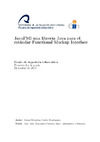Identificador persistente para citar o vincular este elemento:
https://accedacris.ulpgc.es/jspui/handle/10553/12681
| Campo DC | Valor | idioma |
|---|---|---|
| dc.contributor.advisor | Hernández Cabrera, José Juan | - |
| dc.contributor.author | Cortés Montenegro, Johan Sebastián | - |
| dc.contributor.other | Escuela de Ingeniería Informática | en_US |
| dc.date.accessioned | 2015-01-17T03:31:03Z | - |
| dc.date.accessioned | 2018-06-04T13:58:00Z | - |
| dc.date.available | 2015-01-17T03:31:03Z | - |
| dc.date.available | 2018-06-04T13:58:00Z | - |
| dc.date.issued | 2014 | en_US |
| dc.identifier.uri | https://accedacris.ulpgc.es/handle/10553/12681 | - |
| dc.description.abstract | El estándar Functional Mockup Interface (FMI), es un estándar abierto e independiente de cualquier aplicación o herramienta que permite compartir modelos de sistemas dinámicos entre aplicaciones. Provee una interfaz escrita en lenguaje C que ha de ser implementada por las distintas herramientas exportadoras y pone en común un conjunto de funciones para manipular los modelos. JavaFMI es una herramienta que permite utilizar simulaciones que cumplen con el estándar FMI en aplicaciones Java de una manera muy simple, limpia y eficiente. Es un proyecto open source con licencia LGPL V2.1H y su código fuente se encuentra disponible para ser clonado en la pagina del proyecto. El proyecto se encuentra alojado en www.bitbucket.org/siani/javafmi y cuenta con una página de bienvenida donde se explica como se usa la librería, una página para reportar incidencias o solicitar que se implementen nuevas historias y una página donde se listan todas las versiones que hay disponibles para descargar. JavaFMI se distribuye como un fichero zip que contiene el .jar con el código compilado de la librería una carpeta lib con las dos dependencias que tiene con librerías externas y una copia de la licencia. Comparada con JFMI, con menos lineas de código, una API limpia, expresiva y auto documentada, y un rendimiento que es un 66 % mejor, JavaFMI es objetivamente la mejor herramienta Java que existe para manipular FMUs de la versión 1.0 y 2.0 del estándar FMI. | en_US |
| dc.description.abstract | The Functional Mockup Interface (FMI) is an open standard and independent of any application or tool, which allows to share models of dynamic systems called Functional Mockup Units FMUs between different applications. It provides an interface written in C language which puts a common set of functions to manipulate models and must be implemented by the different exporting tools in order to generate an FMU. JavaFMI is a library which allows the user to use FMUs within Java applications in a ve y easy and simple way. It is an open source project with license LGPL v2.1 and its code is hosted in the project web page www.bitbucket.org/siani/javafmi which explains how the library is used. There is too a page to report issues or request new stories and a page where are listed all the implemented versions available for download. JavaFMI is distributed as a zip file containing the jar with the compiled code, its dependencies and the license files. In comparison with JFMI, with fewer lines of code, a clean, expressive and self-documented API and a performance which is 66% faster, JavaFMI is objectively the best Java tool that exists to manipulate FMUs version 1.0 and 2.0 standard IMF . | en_US |
| dc.format | application/pdf | es |
| dc.language | spa | en_US |
| dc.rights | by-nc-nd | es |
| dc.subject | 120317 Informática | en_US |
| dc.subject.other | FMI | en_US |
| dc.subject.other | JavaFMI | en_US |
| dc.subject.other | Java | en_US |
| dc.subject.other | Library | en_US |
| dc.subject.other | Functional | en_US |
| dc.subject.other | Interface | en_US |
| dc.subject.other | Mockup | en_US |
| dc.subject.other | Open | en_US |
| dc.subject.other | Source | en_US |
| dc.title | JavaFMI una librería Java para el estándar Functional Mockup Interface | en_US |
| dc.type | info:eu-repo/semantics/bachelorThesis | en_US |
| dc.type | BachelorThesis | en_US |
| dc.compliance.driver | 1 | es |
| dc.contributor.departamento | Departamento de Informática y Sistemas | en_US |
| dc.contributor.facultad | Escuela de Ingeniería Informática | en_US |
| dc.identifier.absysnet | 705383 | es |
| dc.investigacion | Ingeniería y Arquitectura | en_US |
| dc.rights.accessrights | info:eu-repo/semantics/openAccess | es |
| dc.type2 | Trabajo final de grado | en_US |
| dc.utils.revision | Sí | en_US |
| dc.identifier.matricula | TFT-33572 | es |
| dc.identifier.ulpgc | Sí | en_US |
| dc.contributor.buulpgc | BU-INF | en_US |
| dc.contributor.titulacion | Grado en Ingeniería Informática | es |
| item.grantfulltext | open | - |
| item.fulltext | Con texto completo | - |
| crisitem.advisor.dept | GIR SIANI: Inteligencia Artificial, Redes Neuronales, Aprendizaje Automático e Ingeniería de Datos | - |
| crisitem.advisor.dept | IU de Sistemas Inteligentes y Aplicaciones Numéricas en Ingeniería | - |
| crisitem.advisor.dept | Departamento de Informática y Sistemas | - |
| Colección: | Trabajo final de grado | |
Visitas 10
128
actualizado el 11-ene-2026
Descargas
328
actualizado el 11-ene-2026
Google ScholarTM
Verifica
Comparte
Exporta metadatos
Los elementos en ULPGC accedaCRIS están protegidos por derechos de autor con todos los derechos reservados, a menos que se indique lo contrario.
